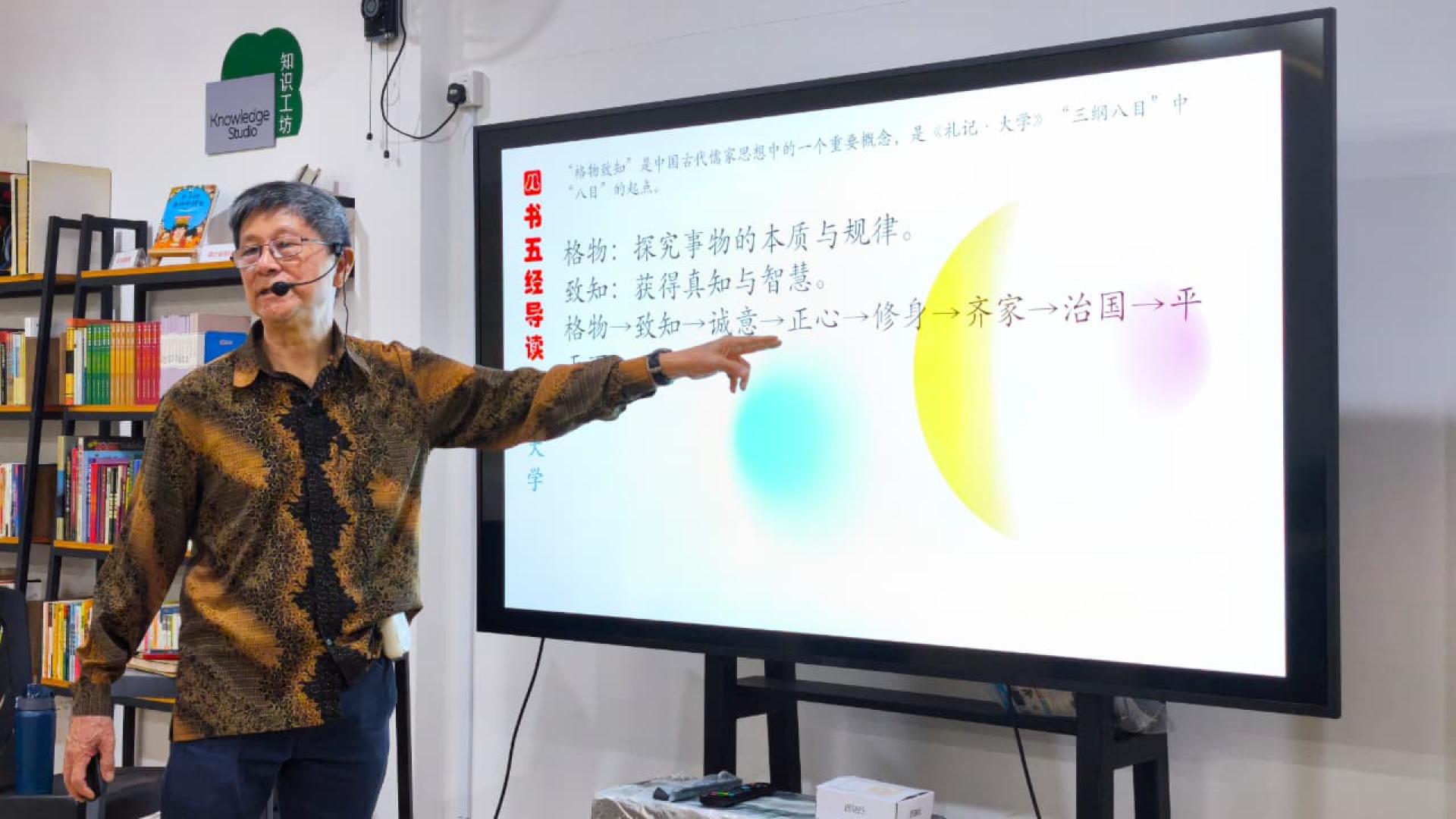(City, 20th) – The Jide Care Association’s flagship program, “Cultural Academy,” launched the second session of its October series on the 16th. This semester’s curriculum covers classic philosophy, the evolution of official systems, traditional festivals, and historical transitions, aiming to provide participants with a systematic platform to understand the essence of outstanding Chinese traditional culture.
The core segment of this session, [Classics Reading], focuses on a key Confucian concept—'gewu zhizhi' (investigating things to acquire knowledge). The course explores how to obtain true wisdom through probing the principles of things, tracing the progression from 'investigating things' and 'acquiring knowledge' to 'sincerity of intention,' 'rectification of the mind,' and ultimately achieving the Confucian cultivation stages of 'self-cultivation, regulating the family, governing the state, and bringing peace to the world.' This helps students deeply appreciate the close connection between internal cultivation and external achievements found in ancient Chinese philosophy.
In the [Cultural Knowledge] section, the course offers a journey through the evolution of China’s official system over millennia. From the 'Three Lords and Nine Ministers' system of the Qin and Han Dynasties, to the well-established 'Three Departments and Six Ministries' system of the Sui and Tang Dynasties, and finally, to the apex of centralized power with the 'Grand Council' of the Qing Dynasty, the historical context was combed through to showcase the structural evolution of the central official system in ancient China and its background, helping students understand the governance wisdom and operational modes of power in the ancient state.
In the golden autumn season, the [Traditional Festivals] course aptly introduced the upcoming Double Ninth Festival, which falls on the ninth day of the ninth month of the lunar calendar. The class analyzed the ancient origins of exorcising evil and avoiding misfortune, as well as legends such as Huan Jing slaying the plague demon with his sword. It also gave an in-depth look at diverse festival customs like climbing to high places, wearing dogwood, drinking chrysanthemum wine, and tasting Double Ninth cake, allowing attendees to feel the festival’s rich themes of honoring elders, filial piety, and best wishes for peace.
Additionally, the [Historical Overview] unit turned its attention to the turbulent 'Five Dynasties and Ten Kingdoms' period. The course clearly outlined this transitional era between the Tang and Song dynasties, explaining the succession of dynasties and the proliferation of regimes. This helped fill an important gap in students’ historical understanding and provided greater insight into the process of moving from division to unification in Chinese history.
A representative of Jide Care Association stated that the “Cultural Academy” series will continue to be dedicated to exploring and disseminating outstanding traditional Chinese culture, enhancing students’ humanistic literacy and cultural self-confidence through systematic instruction and interaction.
The core segment of this session, [Classics Reading], focuses on a key Confucian concept—'gewu zhizhi' (investigating things to acquire knowledge). The course explores how to obtain true wisdom through probing the principles of things, tracing the progression from 'investigating things' and 'acquiring knowledge' to 'sincerity of intention,' 'rectification of the mind,' and ultimately achieving the Confucian cultivation stages of 'self-cultivation, regulating the family, governing the state, and bringing peace to the world.' This helps students deeply appreciate the close connection between internal cultivation and external achievements found in ancient Chinese philosophy.
In the [Cultural Knowledge] section, the course offers a journey through the evolution of China’s official system over millennia. From the 'Three Lords and Nine Ministers' system of the Qin and Han Dynasties, to the well-established 'Three Departments and Six Ministries' system of the Sui and Tang Dynasties, and finally, to the apex of centralized power with the 'Grand Council' of the Qing Dynasty, the historical context was combed through to showcase the structural evolution of the central official system in ancient China and its background, helping students understand the governance wisdom and operational modes of power in the ancient state.
In the golden autumn season, the [Traditional Festivals] course aptly introduced the upcoming Double Ninth Festival, which falls on the ninth day of the ninth month of the lunar calendar. The class analyzed the ancient origins of exorcising evil and avoiding misfortune, as well as legends such as Huan Jing slaying the plague demon with his sword. It also gave an in-depth look at diverse festival customs like climbing to high places, wearing dogwood, drinking chrysanthemum wine, and tasting Double Ninth cake, allowing attendees to feel the festival’s rich themes of honoring elders, filial piety, and best wishes for peace.
Additionally, the [Historical Overview] unit turned its attention to the turbulent 'Five Dynasties and Ten Kingdoms' period. The course clearly outlined this transitional era between the Tang and Song dynasties, explaining the succession of dynasties and the proliferation of regimes. This helped fill an important gap in students’ historical understanding and provided greater insight into the process of moving from division to unification in Chinese history.
A representative of Jide Care Association stated that the “Cultural Academy” series will continue to be dedicated to exploring and disseminating outstanding traditional Chinese culture, enhancing students’ humanistic literacy and cultural self-confidence through systematic instruction and interaction.
